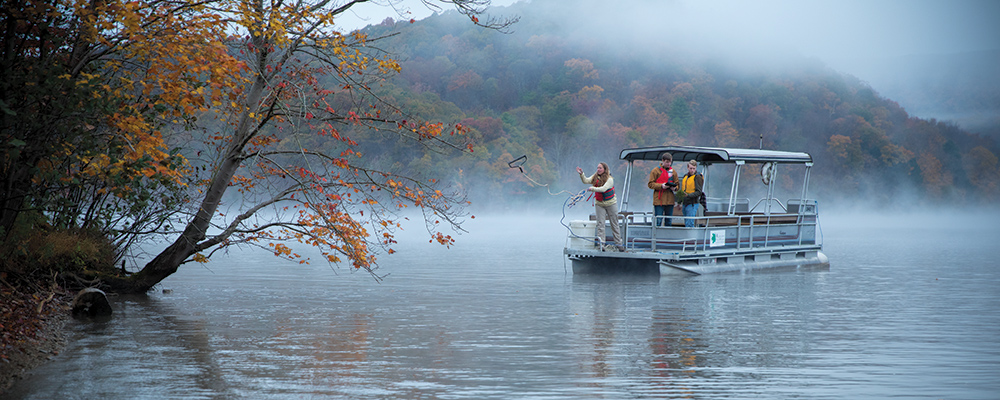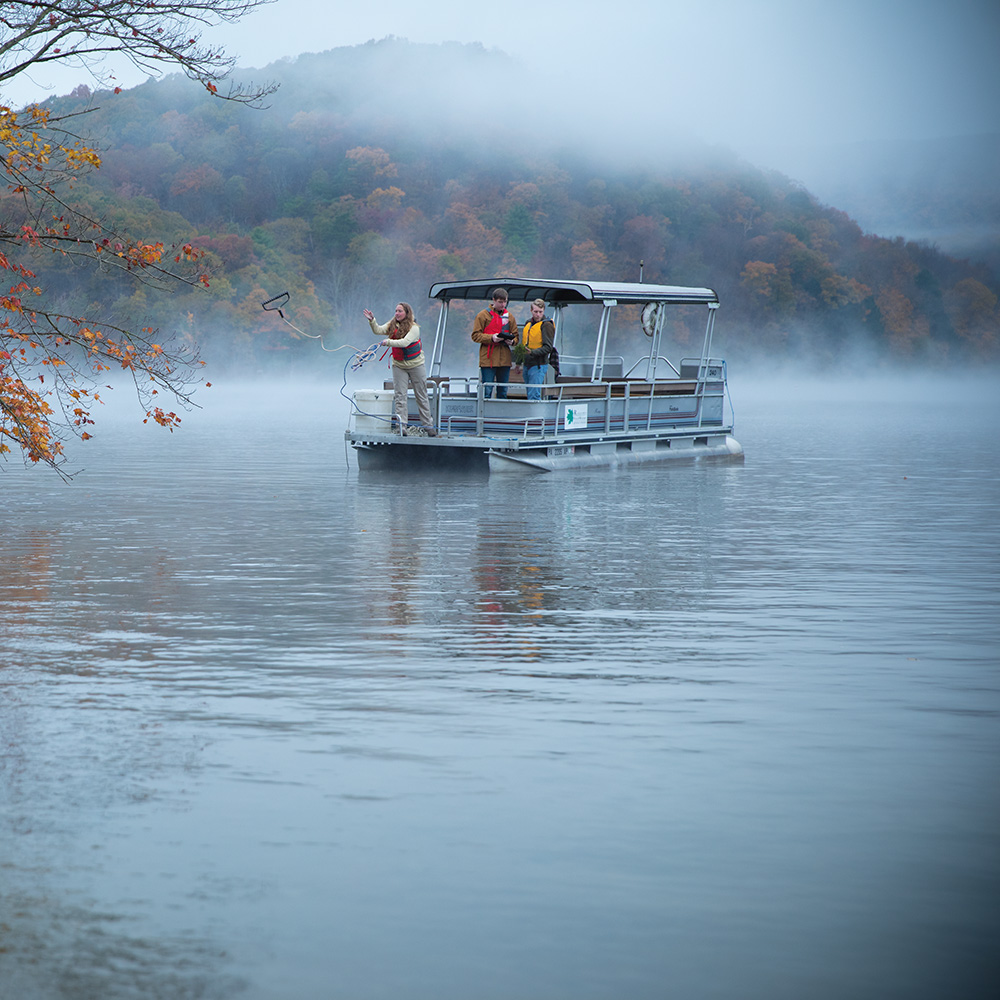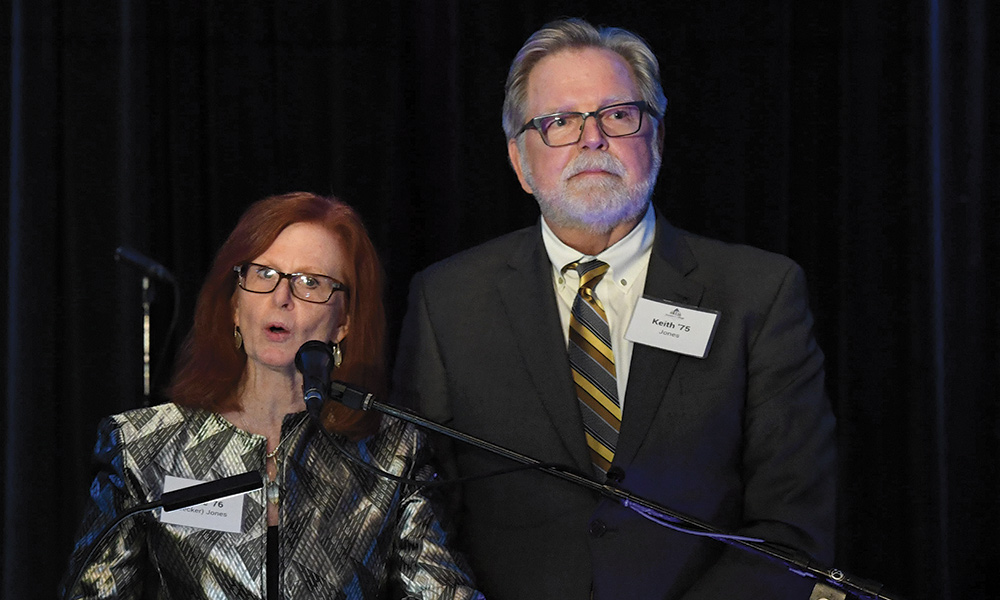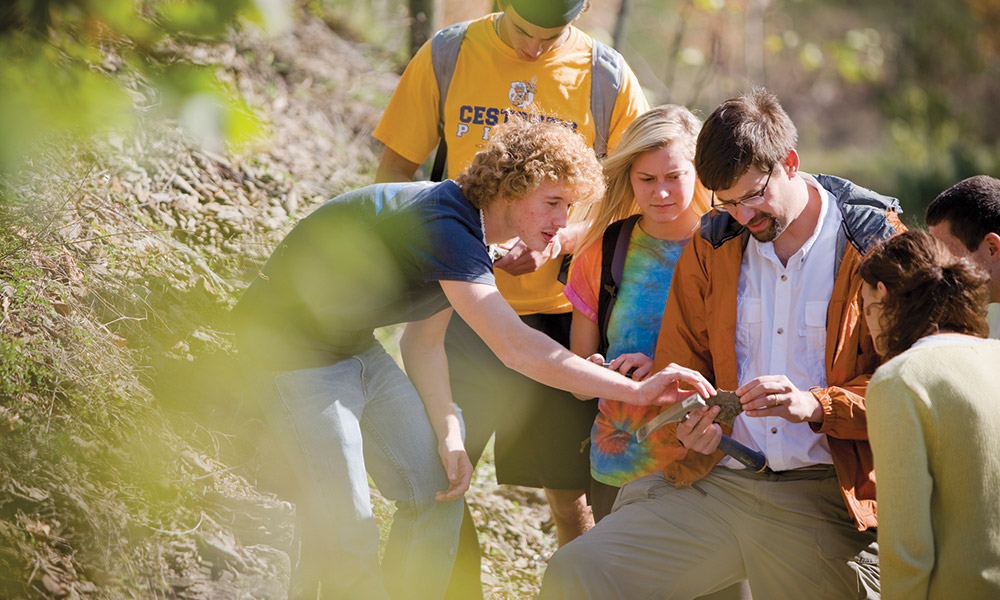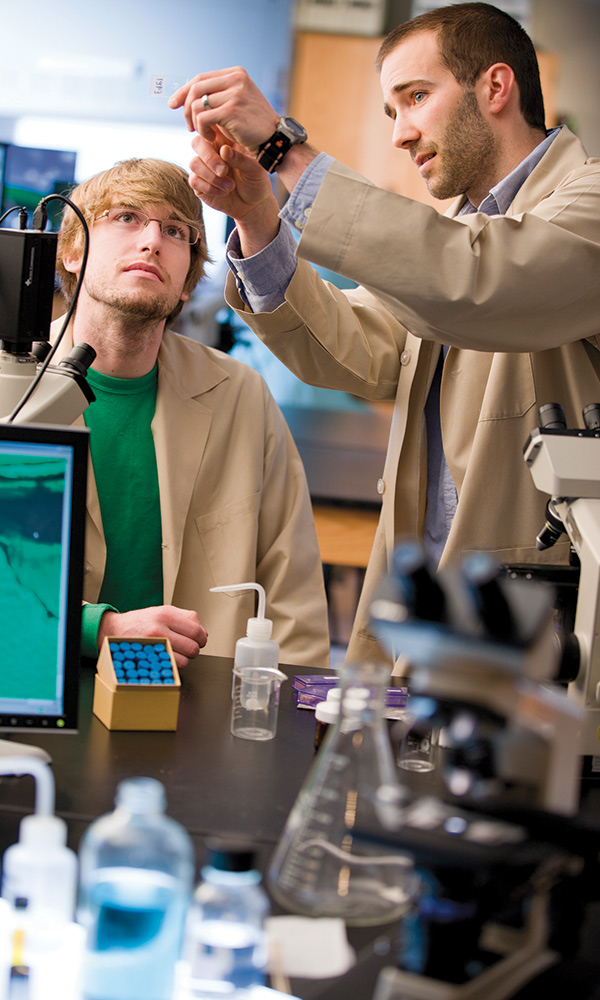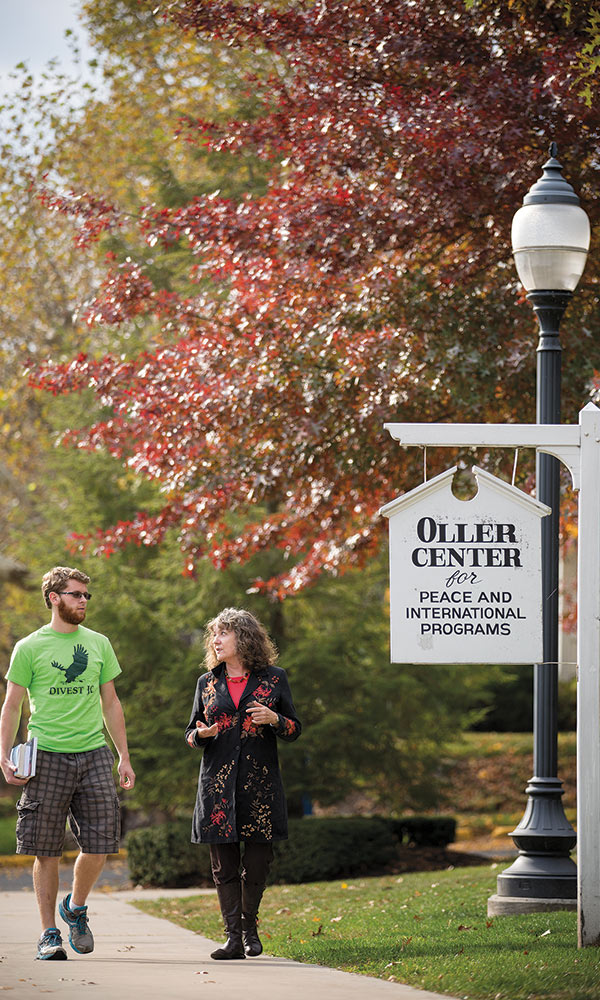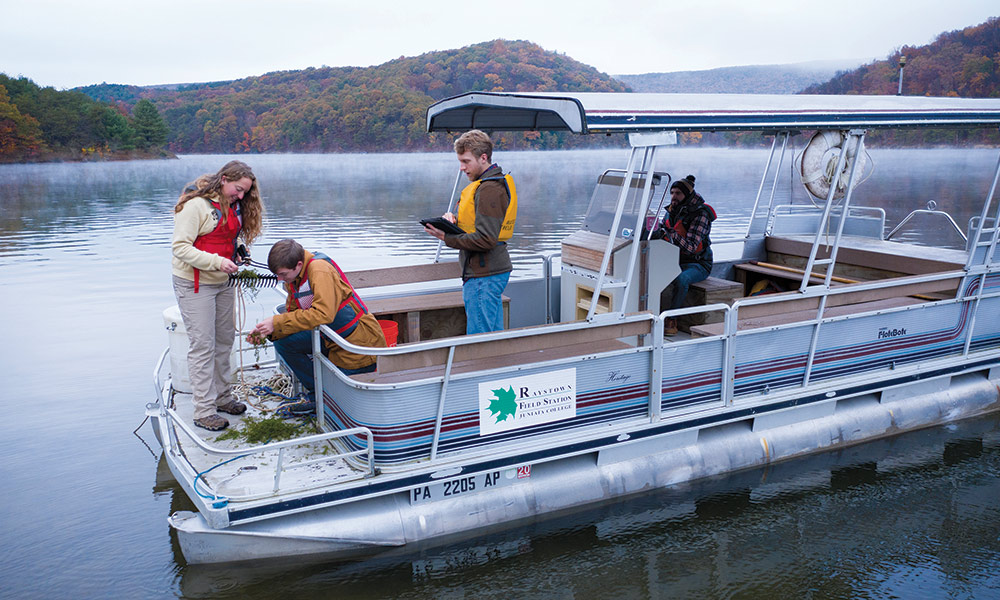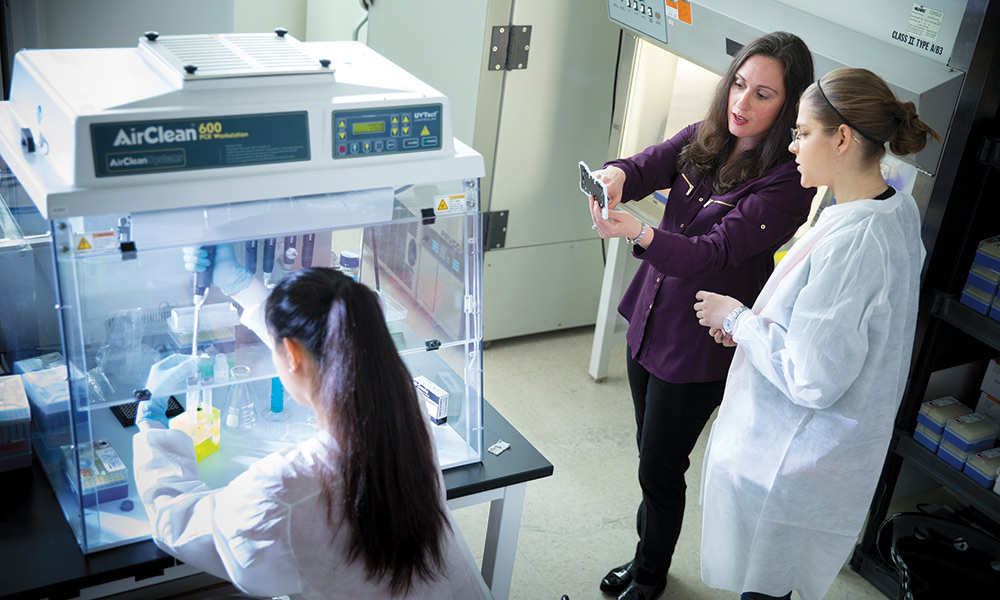At Juniata, the undergraduate experience is broadened as students delve into their chosen field and acquire experience they will carry with them in their future careers.
“I am a scientist by training and quite aware that, at the time I was in college, undergraduate research experiences were relatively rare,” said Elaine (Becker) Jones ’76, who along with her husband, Keith Jones ’75, have planned for $1.5 million to support undergraduate research at Juniata. “Coming to Liberal Arts Symposium, you can see how many Juniata students are engaged in research. This is a highly differentiated experience for Juniata students to have.”
At Juniata, undergraduate research opportunities take place in partnership with faculty in a pursuit of deeper understanding across disciplines—from sciences to the humanities.
“For me, research was something that I wanted to try and explore,” said Lavinia Unverdorben ’20. “In my first semester, the biology labs introduced me to the idea of undergraduate research and allowed me to connect with professors conducting research on campus. The research Chris Grant, assistant professor of biology, right, strives to facilitate a collaborative learning environment with his students through research opportunities. opportunities have been important for me because they exposed me to a whole new world of learning and problem solving.”
Lavinia embarked on her first research project with Chris Grant, assistant professor of biology.
“Research is the best example I can think of to facilitate a collaborative learning environment,” said Chris. “The student takes the lead on the specific project with full support, oversight, and input from a faculty member.”
Delving deeper into established knowledge is beneficial to every discipline, which is why the Jones’ gift of funding for summer research is not limited to science
“I was not a science major,” said Keith. “You don’t have to be a science major to receive the funding. You can be studying in any area that Juniata offers and work closely with experts in the field. It’s not limited to someone whose POE is in the sciences—it can be in any discipline.”
In the field of peace and conflict studies, Polly Walker, director of The Baker Institute and associate professor of peace and conflict studies, described research as adding rigor and a foundation in truth and reality within the field.
“My research is inspired by working within a wide network of relationships and by social justice and conflict transformation,” said Polly. “I work with students to identify their interests and capabilities.”
Recent events inspire students and faculty alike. Peace and conflict studies students have investigated the ways in which art and culture support ethical and sustainable conflict transformation, especially in light of the injustices suffered by migrant children held in detention.
“You don’t have to be a science major to receive the funding. You can be studying in any area that Juniata offers and work closely with experts in the field. It’s not limited to someone whose POE is in the sciences—it can be in any discipline.” Keith Jones ’75, RETIRED EDUCATOR
Faculty members generate research ideas and opportunities through attendance at conferences and reading the leading literature in their respective fields.
“Good research is always informed by previous work,” said Ursula Williams, assistant professor of chemistry. “By hearing and learning from the results of others, and by synthesizing this information, I identify holes in the current state of chemical knowledge, and I consider which of these holes my students and I are best poised to address.”
The students’ undergraduate experience in research may take a different form depending on the discipline.
“Within the psychology department, student research happens in three different ways,” said Phil Dunwoody, professor of psychology and director of assessment and general education. “First, faculty have research labs that focus on their areas of expertise. Students can join our research labs and learn the process through handson experience. Second, all psychology students complete a two-course research methods sequence where they choose their own research topic. Students love pursuing their own ideas in this sequence and really get involved in their own projects. Lastly, some students choose to do a senior thesis, which is a year-long project of their own design.”
The students’ own interests are considered when planning research topics. “Some students come to me with projects that they are interested in,” said Ryan Mathur ’96, professor of geology. “There are multiple steps in the research they conduct, material isolation and characterization are things that students can do here and are valuable pieces to the research that I conduct. I see them as contributors to the whole project. The longer students work with me, the more involved they become in the projects and take more ownership.”
The understanding formed through research benefits peers and professionals in the field and influences their work as well.
“Research is how new chemical knowledge is formed,” said Ursula. “Without it, there wouldn’t be a field of chemistry, and the many fields that chemistry immediately touches would be much less developed.”
Undergraduate research conducted at Juniata has appeared in leading publications such as the American Society for Microbiology, Journal of Freshwater Ecology, Northeastern Naturalist, International Journal of Environmental Research and Public Health, and Evolutionary Behavioral Sciences.
“Long-term impacts of research are seen in their outcomes,” said Regina “Gina” Lamendella, Valko Professor of Biological Sciences. “I have mentored more than 70 undergraduate research students in my laboratory and more than 30 of them have completed or are engaged in competitive Ph.D., MD/Ph.D., or VMD/ Ph.D. programs or master’s programs. Within my laboratory, I have had the opportunity to mentor three Fulbright Fellows, three Goldwater Fellows, six NIH IRTA (National Institutes of Health Intramural Research Training Award) post-baccalaureate fellows, and two HHMI EXROP (Howard Hughes Medical Institute Exceptional Research Opportunities Program) fellows. The very fabric of research in our lab is woven by the hard work of more than 70 talented undergraduate research students with 70 unique stories.”
“A small investment here gets a larger result. This allows them to help each other along the way, participate in lab and field work, and build a sense of community in which they can grow and depend upon during their time at Juniata.”Elaine (Becker) Jones ’76, RETIRED VENTURE CAPITALIST
Through the Jones’ gift, opportunities for mentored undergraduate research expand. “The currency you need as a scientist includes hands-on experience, the ability to understand the scientific method, sharing presentations, and having your work published,” said Elaine. “That is part Students are valued contributors to research conducted by Ryan Mathur ’96, professor of geology, and the benefit is experienced by both their peers and professionals in the field. and parcel of how a scientist matures. I’m very hopeful that students will have that opportunity to fuel research endeavors.”
She described undergraduate research as a way faculty can excite and promote their students—a gift that keeps on giving.
“It’s a forced-multiplier event. A small investment here gets a larger result,” Elaine said. “This allows them to help each other along the way, participate in lab and fieldwork, and build a sense of community in which they can grow and depend upon during their time at Juniata.
Lavinia’s experience is evidence of that growth.
“The research experiences at Juniata have allowed me to grow not just as a scientist, but also as a person. I have grown from a person who wasn’t comfortable with public speaking to someone who now voluntarily gives research presentations because I love sharing my research with others,” said Lavinia. “The freedom of research has allowed me to explore many different ideas and concepts and to go down different paths and roads that are often not addressed in a traditional classroom setting.”
